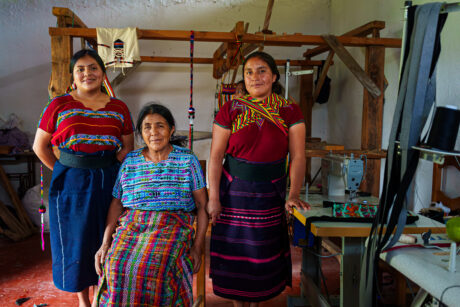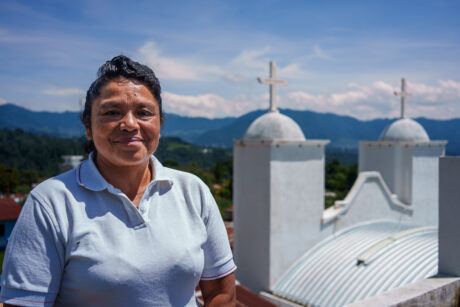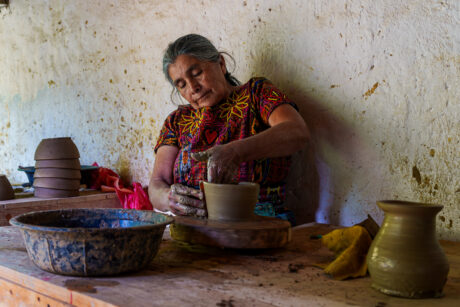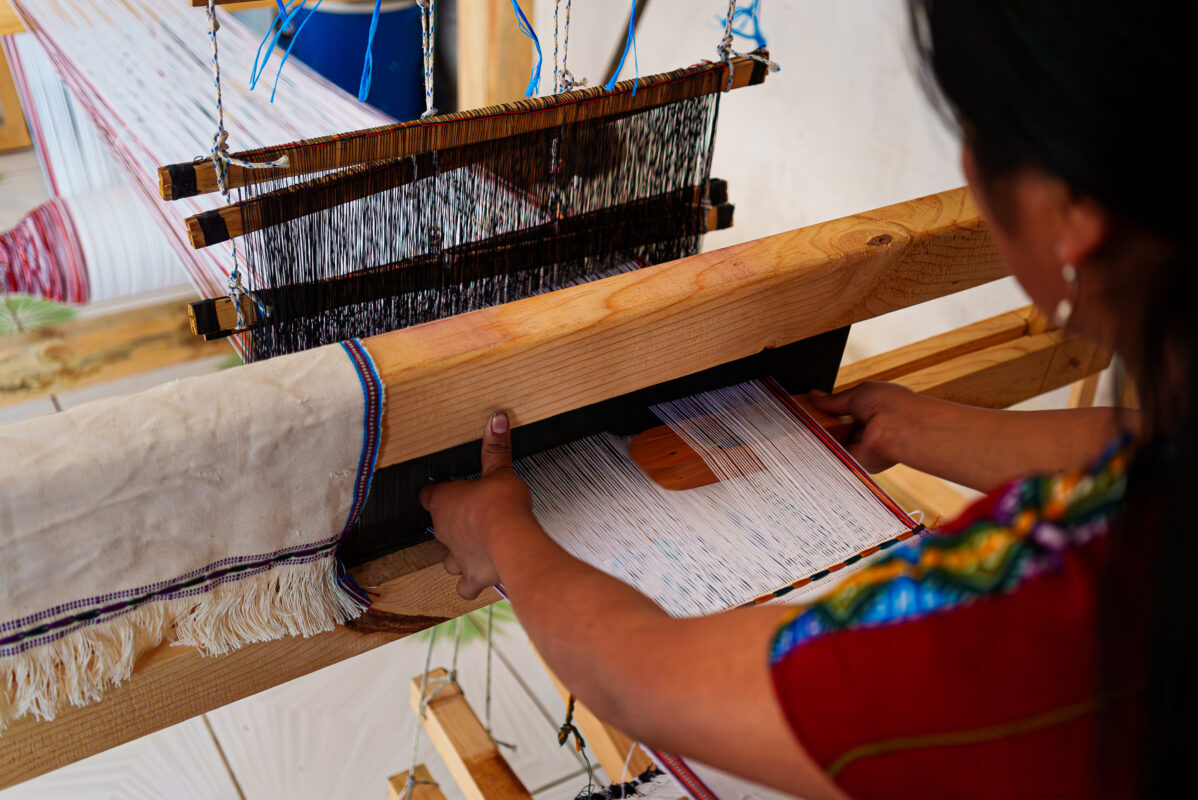Santa Cruz del Quiche, GuatemalaEm agosto, Santa Cruz del Quiche, Guatemala experienced a week-long power outage. The electric company had a conflict with a neighboring area and shut off the power, which cut service to nine sectors and 500 homes in Santa Cruz.
After days without being able to turn on the lights, charge phones or use appliances, residents blocked the main road for two days to pressure the electric company into a resolution.
This is a common narrative in Guatemala. Land border disputes. Conflict over the use of natural resources. Disagreements about local governance. High incidence of violence against women and girls. There is a dotted line connecting all these issues back to Guatemala’s 36-year internal conflict, and the scars are still fresh.
Unresolved social conflict
O 1996 Peace Accords marked the end of Guatemala’s lengthy civil war, but social conflict has continued for the last 26 anos.
“These conflicts can affect both individuals and collective groups of people, cause economic losses due to roadblocks, result in violence, injuries, and even death,”diz Norman Martinez, Institutional Strengthening Specialist for the Projeto de Construção da Paz, conhecido como Tecendo a Paz em espanhol.
Tecendo a Paz, is a 6.5-year peacebuilding project funded by the NÓS. Agência para o Desenvolvimento Internacional (USAID) reduzir o conflito social e a violência e fortalecer a coesão social nas Terras Altas Ocidentais da Guatemala. The project works with Government of Guatemala to increase its capacity to address social conflict, specifically through improved coordination and communication. It is implemented by Creative Associates International with PartnersGlobal and ProPaz.
“Conflict is inherent to interpersonal relationships and therefore present in all societies and communities,” explains Luz Lainfiesta, Deputy Chief of Party of Tecendo a Paz. “The key is to have a strong institutional framework, with the capacity, tools and systems for the prevention, peaceful resolution and transformation of conflicts into opportunities for development.”
Strengthening institutions, building capacity
Government leadership and institutional responses are key to resolving conflict and building more peaceful and safe communities. Formado em 2020, the Presidential Commission for Peace and Human Rights (Comissão de Paz e Direitos Humanos, COPADEH), is the government’s institution responsible for preventing and mitigating conflict at national and departmental levels. The effective functioning of COPADEH has taken time though, as it consolidated the previous institutions that had been working on some of these conflicts for years and introduced new staff and a different mandate.
In need of capacity building within the recently formed commission, COPADEH sought support from Tecendo a Paz to train their newly hired staff and increase their capacity to respond to local conflict.
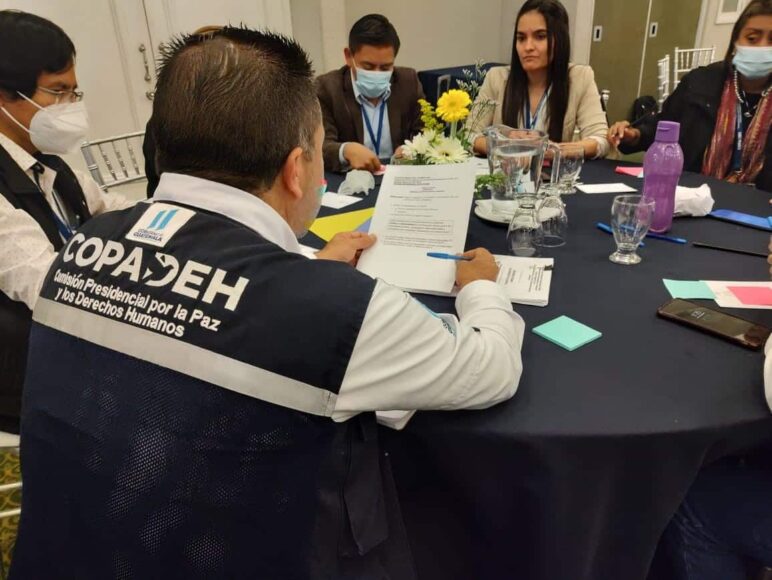
Em setembro 2021, Tecendo a Paz and COPADEH signed an agreement to strengthen the commission. One part of the agreement was to strengthen COPADEH’s executive and technical staff’s capacity to carry out dialogue, negotiations, and conflict management, with a focus on peaceful and sustainable solutions. COPADEH demonstrated their commitment to the training by covering nearly 40 percent of the costs, while requesting technical support from Tecendo a Paz.
“When we have well-trained staff who understand their responsibilities, the institution is stronger and more capable,” says Eddy Cano, COPADEH’s Deputy Director and a committed partner who accompanied Tecendo a Paz’s training process every step of the way. “The training has helped to clarify the responsibilities of the delegates and align us, improving COPADEH’s functionality and allowing us to focus on the tasks at hand.”
Turning on the electricity
Miguel De Leon, the regional delegate for the department of Quiché, was one of the 66 COPADEH representatives that participated and graduated from the conflict mitigation course and has already seen its benefits.
The training “gave me tools to analyze conflict and identify new key actors and to give the approach a new focus to address the conflict,” says De Leon.
De Leon and the other COPADEH representatives have used their training to peacefully transform conflict, including the power outage conflict in Santa Cruz.
“To mitigate the conflict in Santa Cruz, I used three tools that I learned in the training with Tecendo a Paz,” shares De Leon. “First, an analysis tool that helps to compile important information about the conflict like key actors and their role in the conflict, the history and actions taken, and the current reality of the conflict. Then I developed the route to address the conflict and held roundtable discussions.”
De Leon, along with the Governor of Quiche and representatives from the Ministry of Energy and Mines, the Municipality of Santa Cruz, and Civil Society Organizations participated in the roundtable discussions with the electric company, were able to come to an agreement, and the power was turned back on.
The conflict in Santa Cruz lasted a relatively short time and in some ways was a simpler conflict than others that COPADEH has mitigated since the training with Tecendo a Paz começou. Do 32 conflicts that COPADEH has resolved since October 2021, many were long-standing, complexo, and tense situations, that required intervention from multiple actors, new strategies, and diverse perspectives.
Linking national and local institutions
Sustainability and local ownership are critical in building peace and overcoming the scars of years of conflict. Tecendo a Paz works with government counterparts to increase their capacity and improve coordination between national, departamental, and municipal levels to respond to community priorities.
Cano has seen that the improvement is apparent to outside institutions and civil society organizations as well.
“We’ve seen an uptick in the number of cases that we’re addressing, and it is not because there are more conflicts, instead it’s because more people are coming to COPADEH for help to address conflict,” says Cano.
Many long-standing conflicts in the Western Highlands are rooted in the government’s limited presence in rural communities. Tecendo a Paz and COPADEH are working to change that by
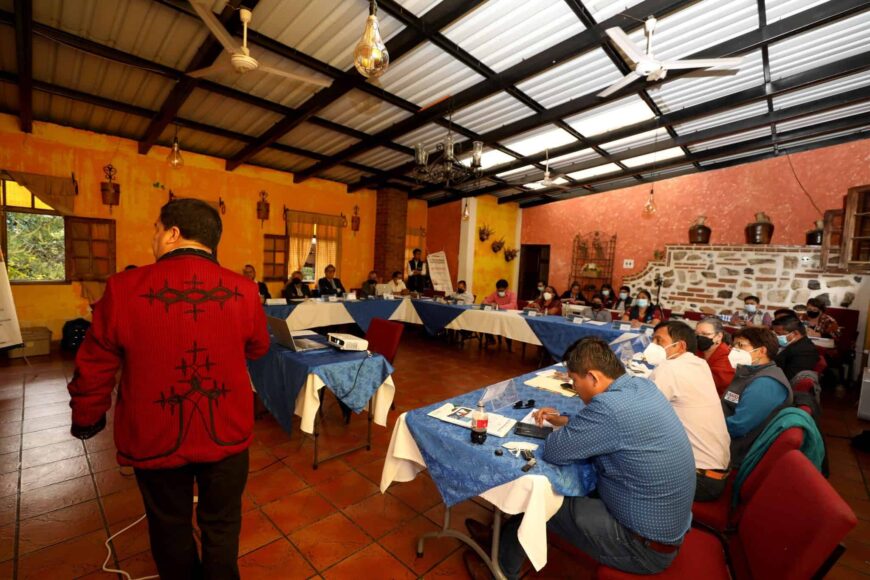
vinculando seus delegados regionais à Comissão Departamental de Segurança e Gestão de Conflitos, CODESAC is the Spanish acronym.
O CODESAC é liderado pelo governador departamental e responsável por gerar diálogo e coordenação entre instituições públicas como o COPADEH, organizações da sociedade civil, e o setor privado, para implementar estratégias, plans and programs to address social conflict and prevent escalation into violence.
“Dentro do plano nacional do Governo da Guatemala, a prioridade é proteger a vida dos guatemaltecos e viver em paz,” diz Otto Ervin Macz, former Governor of Quiche and former CODESAC Director.
“Graças a Tecendo a Paz e com o apoio da USAID, foi possível ao CODESAC capacitar e fortalecer os processos de diálogo. O efeito desses treinamentos foi demonstrado através dos conflitos de alto impacto que conseguimos resolver e que culminaram em paz e tranquilidade, para tantos que vivem neste belo departamento.”
Tecendo a Paz está ajudando instituições nacionais como COPADEH, instituições departamentais como CODESAC, e indivíduos como De Leon para resolver conflitos e unir comunidades para que possam se unir, encontrar um terreno comum, e transformar a Guatemala, um conflito de cada vez.
